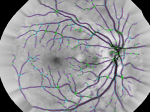HiDRA: Hierarchical Deep Representations of Anatomy
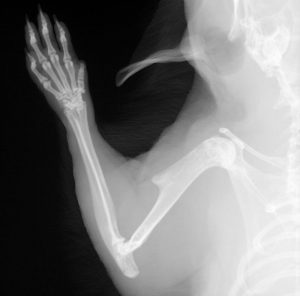 Musculoskeletal disorders (MSKs) are responsible for 12% of all general practitioner visits in the UK at a cost of 10.8 million working days and some £4.7 billion to the NHS per year. High-throughput phenotyping in mice plays a crucial role in understanding the genetic mechanisms behind MSKs, but requires meticulous, manual inspection of x-rays that is prohibitively time-consuming to perform at scale. HiDRA will develop novel computational approaches based on machine learning to automatically annotate a wide range of skeletal abnormalities, utilising data from the International Mouse Phenotyping Consortium (IMPC). This project is funded through an EPSRC New Investigator Award in collaboration with the Mary Lyon Centre at MRC Harwell.
Musculoskeletal disorders (MSKs) are responsible for 12% of all general practitioner visits in the UK at a cost of 10.8 million working days and some £4.7 billion to the NHS per year. High-throughput phenotyping in mice plays a crucial role in understanding the genetic mechanisms behind MSKs, but requires meticulous, manual inspection of x-rays that is prohibitively time-consuming to perform at scale. HiDRA will develop novel computational approaches based on machine learning to automatically annotate a wide range of skeletal abnormalities, utilising data from the International Mouse Phenotyping Consortium (IMPC). This project is funded through an EPSRC New Investigator Award in collaboration with the Mary Lyon Centre at MRC Harwell.
HiDRA
Dates: 2022-2025
Value: £300K
PI: Dr James Brown (jamesbrown@lincoln.ac.uk)
PhDs funded through UoL’s EPSRC Doctoral Training Partnership
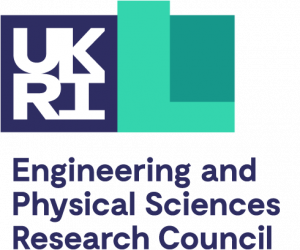 The University of Lincoln’s EPSRC Doctoral Training Partnership (DTP) provides PhD studentships in particular thematic areas of robotics and artificial intelligence: smart energy, medical and healthcare support systems and bio-physics inspired robotics. Three academics within the Laboratory of Vision Engineering (LoVE) have secured four studentships through the DTP in the following areas:
The University of Lincoln’s EPSRC Doctoral Training Partnership (DTP) provides PhD studentships in particular thematic areas of robotics and artificial intelligence: smart energy, medical and healthcare support systems and bio-physics inspired robotics. Three academics within the Laboratory of Vision Engineering (LoVE) have secured four studentships through the DTP in the following areas:
- Early detection of secondary infection in COPD patients from breath condensates (Duan)
- Weakly supervised segmentation of brain tumours from multi-modal MRI data (Brown)
- Learning-based registration and segmentation of mass spectrometry image data (Brown)
- Cartilage lesion detection on knee MRIs and automated rehabilitation assessment (Zhang)
Dates: 2020-2025
Supervisors: Dr Wenting Duan, Dr James Brown, Dr Lei Zhang
Predicting the location of lung nodule occurrence from low-dose CT using convolutional time-to-event networks
The aim o f this project is to develop and test a novel artificial intelligence (AI) architecture that combines baseline LDCT studies with other patient information such as age, smoking status, and smoking history (patient demographics) to personalize screening intervals for patients at risk of developing lung cancer.
f this project is to develop and test a novel artificial intelligence (AI) architecture that combines baseline LDCT studies with other patient information such as age, smoking status, and smoking history (patient demographics) to personalize screening intervals for patients at risk of developing lung cancer.
Dates: 2019-2020
Value: 100k
University PI: Prof Xujiong Ye (xye@lincoln.ac.uk)
PRaVDA: Proton Radiotherapy Verification and Dosimetry Application
 PRaVDA will produce the world’s first accurate proton CT images for patients undergoing Proton Therapy for the treatment of cancer. The dose uncertainty will be reduced from +/-3.5% to +/-0.5%, so allowing more patients to benefit safely from this revolutionary treatment. PRaVDA is probably the most complex medical imaging system ever conceived. Our international consortium consists of 6 universities, 5 NHS trusts and the National Research Laboratories in South Africa.
PRaVDA will produce the world’s first accurate proton CT images for patients undergoing Proton Therapy for the treatment of cancer. The dose uncertainty will be reduced from +/-3.5% to +/-0.5%, so allowing more patients to benefit safely from this revolutionary treatment. PRaVDA is probably the most complex medical imaging system ever conceived. Our international consortium consists of 6 universities, 5 NHS trusts and the National Research Laboratories in South Africa.
![]() PRaVDA
PRaVDA
Dates: 2013-2016
Value: 1.6m
PI: Prof Nigel Allinson (nallinson@gmail.com)
REVAMMAD: Retinal Vascular Modelling, Measurement and Diagnosis
REVAMMAD is aimed at combating some of the the EU’s most prevalent chronic medical 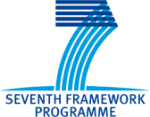 conditions using retinal imaging. The 3.8 million euro project is training a new generation of interdisciplinary scientists for the academic, clinical and industrial sectors, and will trigger a new wave of biomedical interventions. Our PhD students are receiving training by some of the EU’s leading academics and practitioners to achieve further diagnosis, prognosis and prevention of diseases such as diabetes, hypertension, stroke, coronary heart disease and retinal diseases.
conditions using retinal imaging. The 3.8 million euro project is training a new generation of interdisciplinary scientists for the academic, clinical and industrial sectors, and will trigger a new wave of biomedical interventions. Our PhD students are receiving training by some of the EU’s leading academics and practitioners to achieve further diagnosis, prognosis and prevention of diseases such as diabetes, hypertension, stroke, coronary heart disease and retinal diseases.
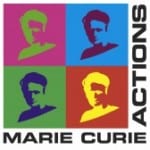
REVAMMAD
Dates: 2013-2016
Value: 3m
PI: Prof Andrew Hunter (ahunter@lincoln.ac.uk)
MyHealthAvatar: A Demonstration of 4D Digital Avatar Infrastructure for Access of Complete Patient Information (FP7-ICT-2011-9)
MyHealthAvatar is an innovative digital representation of health status that is designed to ![]() act as a lifetime companion for individual citizens. It features an underlying architecture that supports the access, collection and sharing of a set of long-term records and information of individual patients. The 4D avatar will be equipped with a set of toolbox for simulation and data analysis to support clinical decisions from medical professionals.
act as a lifetime companion for individual citizens. It features an underlying architecture that supports the access, collection and sharing of a set of long-term records and information of individual patients. The 4D avatar will be equipped with a set of toolbox for simulation and data analysis to support clinical decisions from medical professionals.

MyHealthAvatar
Dates: 2013-2016
Value: 2.5m euro
University PI: Dr Xujiong Ye (xye@lincoln.ac.uk)
MyLifeHub: An Interoperability Hub for Aggregating Lifelogging Data from Heterogeneous Sensors and its Applications in Ophthalmic Care
 MyLifeHub aims to develop advanced techniques for aggregating and interpreting Lifelogging data from heterogeneous sensors for ophthalmic care. It will be utilized as a platform to assess the impact of visual impairment on the quality of life (QoL) of ophthalmic patients both in general health terms and in vision specific terms. Novel data mining and machine learning techniques for the analysis and integration of Lifelogging data will be investigated to allow for the assessment of QoL.
MyLifeHub aims to develop advanced techniques for aggregating and interpreting Lifelogging data from heterogeneous sensors for ophthalmic care. It will be utilized as a platform to assess the impact of visual impairment on the quality of life (QoL) of ophthalmic patients both in general health terms and in vision specific terms. Novel data mining and machine learning techniques for the analysis and integration of Lifelogging data will be investigated to allow for the assessment of QoL.
 Dates: 2014-2016
Dates: 2014-2016
Value: 128k
PI: Dr Xujiong Ye
CI: Dr Tryphon Lambrou
Computer-aided detection (CAD) for Robotic Colonoscopy
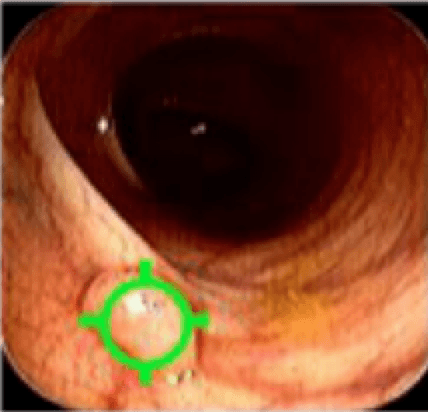 The aim of this project is to study the feasibility of developing computer-aided detection (CAD) algorithms for automated identification of bowel polyps and cancer, by performing advanced computer vision and statistical learning technology on video recorded data at colonoscopy. This will be measured through assessment and matching of identified polyps, mucosal vascularity and lesion morphology to specific mathematical features and differentiation of “normal” from “abnormal”.
The aim of this project is to study the feasibility of developing computer-aided detection (CAD) algorithms for automated identification of bowel polyps and cancer, by performing advanced computer vision and statistical learning technology on video recorded data at colonoscopy. This will be measured through assessment and matching of identified polyps, mucosal vascularity and lesion morphology to specific mathematical features and differentiation of “normal” from “abnormal”.
 Dates: 2016-2017
Dates: 2016-2017
Value: 20k
University PI: Dr Xujiong Ye (xye@lincoln.ac.uk)
A statistical approach for automating ultrasound foetal biometric measurements and quality assurance
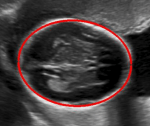 This project aims to develop a platform designed to remove operator-dependence and improve the quality, stability and time efficiency of foetal biometric measurements by developing technologies for:
This project aims to develop a platform designed to remove operator-dependence and improve the quality, stability and time efficiency of foetal biometric measurements by developing technologies for:
- Automated quality assessment of ultrasound scans against the published criteria that are widely accepted.
- Fast and accurate segmentation and measurements of foetal biometry.
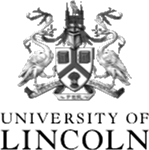
Dates: 2014-2015
Value: 40k
PI: Dr Xujiong Ye
CI: Dr Tryphon Lambrou, Dr Wenting Duan, Prof Nigel Allinson
Clinical Collaborator (ULH): Dr Nick Dudley
Assessment of retinal vascular geometry in patients with age related macular degeneration
The project will evaluate the role of automated RVG analysis in patients with wet-AMD treated with different anti-VEGF agents with regard to identifying disease progression and predicting non-responders to the treatment. The project will operate a novel fully automate vascular analysis software that is capable of extracting various vascular geometrical features of most of the retinal vascular tree across the fundus image, and therefore offering an advanced detailed analysis of the whole vascular network spread across the retina.
 Dates: January 2015 – December 2015
Dates: January 2015 – December 2015
Value: 15k
PI: Dr Bashir Al-Diri
MI-3 Plus: Radiation-hard Wafer-scale CMOS Imagers for Healthcare
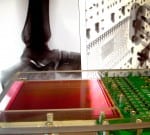 MI-3 Plus develop the world’s largest monolithic radiation-hardened CMOS imager, so meeting one of EPSRC’s Grand Challenges. DynAMITe is effectively four independent cameras in one array with two different spatial resolutions, and it was awarded the IET Innovation Prize for Electronics (2012).
MI-3 Plus develop the world’s largest monolithic radiation-hardened CMOS imager, so meeting one of EPSRC’s Grand Challenges. DynAMITe is effectively four independent cameras in one array with two different spatial resolutions, and it was awarded the IET Innovation Prize for Electronics (2012).
 Dates: 2009-2013
Dates: 2009-2013
Value: 1.2m
PI: Prof Nigel Allinson (nallinson@gmail.com)
Ultimate Microscopy: Wavelength-Limited Resolution Without High Quality Lenses
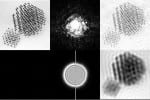 The new method of imaging, called electron ptychography dispense with the lens and instead forms the image by reconstructing the scattered electron-waves after they have passed through the sample using computers. The process has no fundamental experimental boundaries and it is thought it will transform sub-atomic scale transmission imaging.
The new method of imaging, called electron ptychography dispense with the lens and instead forms the image by reconstructing the scattered electron-waves after they have passed through the sample using computers. The process has no fundamental experimental boundaries and it is thought it will transform sub-atomic scale transmission imaging.
 Dates: 2007-2012
Dates: 2007-2012
Value: 4.3m
CoL: Prof Nigel Allinson (nallinson@gmail.com)

